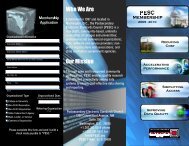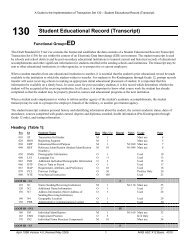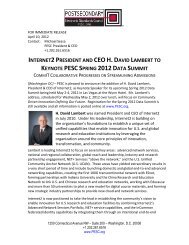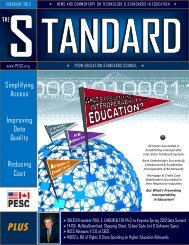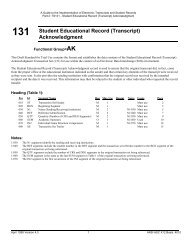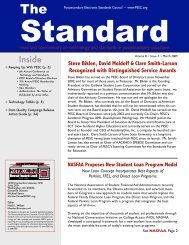The Value of Standards - Delphi Group
The Value of Standards - Delphi Group
The Value of Standards - Delphi Group
Create successful ePaper yourself
Turn your PDF publications into a flip-book with our unique Google optimized e-Paper software.
<strong>The</strong> <strong>Value</strong><br />
<strong>of</strong> <strong>Standards</strong><br />
A <strong>Delphi</strong> Study<br />
June 2003<br />
<strong>Standards</strong> = Liquidity<br />
<strong>The</strong>re is a clear and sudden shift in attitudes towards s<strong>of</strong>tware standards.<br />
<strong>The</strong> climate <strong>of</strong> economic constraint and risk aversion along with the<br />
mandate to integrate systems on both sides <strong>of</strong> the firewall has created a<br />
sea change in the sense <strong>of</strong> imperative to adopt s<strong>of</strong>tware standards.<br />
In this climate standards create liquidity -- the ability to leverage IT investment<br />
in unforseen ways.<br />
In this groundbreaking study, <strong>Delphi</strong> gathered the responses <strong>of</strong> more<br />
than 800 end users, s<strong>of</strong>tware vendors, and service providers to identify<br />
the current attitudes and expectations for s<strong>of</strong>tware standards.<br />
<strong>The</strong> results portray a shifting landscape where standards will provide the<br />
foundation for long term advances in the way s<strong>of</strong>tware is built, bought<br />
and deployed.<br />
©2003 <strong>Delphi</strong> <strong>Group</strong>, Ten Post Office Square, Boston, MA 02109 www.delphigroup.com
©2003 <strong>Delphi</strong> <strong>Group</strong><br />
All right reserved. <strong>Delphi</strong> <strong>Group</strong> clients may make one attributed copy <strong>of</strong> each figure appearing herein. Any additional<br />
disclosure, reproduction, distribution, or communication <strong>of</strong> this information is limited strictly by the contractual terms<br />
governing client’s access to this report. This restriction does not limit client from using this information if it is obtained<br />
from another public source without restriction.<br />
<strong>Delphi</strong> <strong>Group</strong> makes every effort to achieve substantial accuracy in all reported information. <strong>The</strong> research analysis is<br />
created or developed from sources believed to be reliable, however <strong>Delphi</strong> <strong>Group</strong> cannot insure that all data are<br />
ultimately timely or fundamentally correct. Analysis reflects time-sensitive opinion, which is subject to change.
<strong>Delphi</strong> Research<br />
3<br />
Table <strong>of</strong> Contents<br />
What It All Means ........................................................... 4<br />
Executive Overview ........................................................ 8<br />
Bridging the Information Archipelago ........................... 13<br />
<strong>The</strong> Benefit <strong>of</strong> <strong>Standards</strong>: and the Winner Is... ............. 15<br />
...Or Is It? ........................................................................ 17<br />
Narrowing the Field, Increasing the Odds .................... 18<br />
Shifting out <strong>of</strong> Neutral .................................................... 20<br />
Playing the Perception Game ......................................... 22<br />
Exceeding Expectations.................................................. 25<br />
Just One More................................................................. 27<br />
Pr<strong>of</strong>ile <strong>of</strong> Survey Respondents ....................................... 28<br />
©2003 <strong>Delphi</strong> <strong>Group</strong>, Ten Post Office Square, Boston, MA 02109 www.delphigroup.com
<strong>Delphi</strong> Research<br />
4<br />
What It All Means<br />
In a nutshell:<br />
<strong>The</strong> research, follow-up interviews, and analysis for this study all<br />
point to one overwhelming take-away: <strong>Standards</strong> have shifted into<br />
high gear, not only garnering attention from business buyers but<br />
more importantly, they are being seen as a mandate for competitive<br />
stature, cost effective IT and operational excellence.<br />
S<strong>of</strong>tware standards have always been the subject <strong>of</strong> much controversy. In<br />
an industry characterized by a myriad <strong>of</strong> proprietary alternatives,<br />
haphazard collections <strong>of</strong> point solutions, fiefdoms <strong>of</strong> incompatible<br />
applications, and severe integration standards have been an elusive target.<br />
<strong>The</strong> results are clear in their portrayal <strong>of</strong> a<br />
shifting landscape where standards will provide<br />
the foundation for long term advances in the way<br />
s<strong>of</strong>tware is built, bought and deployed.<br />
Although standards have been promoted from the outset as a panacea for<br />
this chaotic landscape, it is not until recently that the forces <strong>of</strong><br />
connectivity, uniform platforms for cross-enterprise/industry applications<br />
and IT industry consolidation have created a climate where standards can<br />
live up to their promise.<br />
In this groundbreaking study, <strong>Delphi</strong> gathered the responses <strong>of</strong> more than<br />
800 end users, s<strong>of</strong>tware vendors, and service providers to identify the<br />
current attitudes and expectations for s<strong>of</strong>tware standards.<br />
<strong>The</strong> findings <strong>of</strong> this study present the clear portrayal <strong>of</strong> a shifting<br />
landscape. <strong>The</strong> economics <strong>of</strong> integration and the mandate for controlling<br />
the cost <strong>of</strong> s<strong>of</strong>tware ownership present a strong business imperative for<br />
standards. <strong>The</strong> maturation and adoption <strong>of</strong> s<strong>of</strong>tware development<br />
standards will provide the foundation for long term advances in the way<br />
s<strong>of</strong>tware is built, bought and deployed.<br />
<strong>The</strong> responses to the survey which underlies this study clearly point to a<br />
greater need for the role <strong>of</strong> s<strong>of</strong>tware standards.<br />
©2003 <strong>Delphi</strong> <strong>Group</strong>, Ten Post Office Square, Boston, MA 02109 www.delphigroup.com
<strong>Delphi</strong> Research<br />
5<br />
<strong>The</strong> attitudes reflect a practical understanding <strong>of</strong> the role that s<strong>of</strong>tware<br />
vendors and standards bodies will play in the symbiosis that allows<br />
foundational standards to evolve. <strong>The</strong> opportunity for significant change<br />
in operational excellence, supply chain interactions, and new market<br />
opportunities from the adoption <strong>of</strong> standards is just as clear.<br />
Among our group <strong>of</strong> survey participants, half indicated participation in a<br />
s<strong>of</strong>tware standards body. This is not difficult to accept given the<br />
While tactical thinking does indeed predominate in<br />
today’s conservative spending climate, the lack <strong>of</strong><br />
enterprise integration has created such a costly<br />
infrastructure that it represents an immediate and<br />
pressing mandate for standards. Compliance with<br />
standards in s<strong>of</strong>tware development is not simply a<br />
strategic direction, but a business imperative.<br />
repercussions and move away from the legacy <strong>of</strong> rampant s<strong>of</strong>tware<br />
deployment in the past that relied on proprietary platforms. Billions <strong>of</strong><br />
dollars have been spent on s<strong>of</strong>tware that represents closed, dead end<br />
solutions. Although it may have taken an economic crisis for standards to<br />
take center stage in the minds <strong>of</strong> organizations, we do not see a return to<br />
prosperity diminishing the trend.<br />
Increased interest in the role <strong>of</strong> componentization <strong>of</strong> applications and the<br />
availability <strong>of</strong> standardized directories for building on-demand<br />
applications will fuel the intent evidenced by IT users and developers <strong>of</strong> IT<br />
solutions to build interoperability.<br />
<strong>The</strong> historical pressure to mitigate the risk <strong>of</strong> picking the wrong standard<br />
will dissipate rapidly as the risk <strong>of</strong> not integrating enterprise and, more<br />
significantly, value chain solutions, increases. Customers, partners and<br />
suppliers will push hard to demand greater flexibility and reliability in the<br />
business processes that are supported by technology. This will translate<br />
into an intense market scrutiny <strong>of</strong> s<strong>of</strong>tware vendors’ ability to work in<br />
synchrony, a mode far removed from the hardwired patchwork solutions<br />
that typify today’s value chains.<br />
©2003 <strong>Delphi</strong> <strong>Group</strong>, Ten Post Office Square, Boston, MA 02109 www.delphigroup.com
<strong>Delphi</strong> Research<br />
6<br />
Leveraging the underlying data and the information systems investment<br />
that has been made in repositories <strong>of</strong> customer, market, and transactional<br />
data will be brought to the center <strong>of</strong> every s<strong>of</strong>tware evaluation. Proprietary<br />
repositories and datastores will be deemed a competitive liability. This is<br />
plainly illustrated as an underlying theme in many <strong>of</strong> the interviews we<br />
conducted for the study, which spoke to the historical risk and cost <strong>of</strong><br />
migrating from applications that held data and information in proprietary<br />
vaults.<br />
<strong>The</strong> current economic pressure to deliver tactical applications may have<br />
caused strategic planning to take a back seat. However, standards and<br />
integration are not luxuries in this sort <strong>of</strong> an environment. <strong>The</strong> study<br />
results show that standards are very much front <strong>of</strong> mind for end users and<br />
s<strong>of</strong>tware developers.<br />
While tactical thinking does indeed predominate in today’s conservative<br />
spending climate, enterprise integration has created such a costly<br />
infrastructure that it represents an immediate and pressing opportunity<br />
What remains to be achieved in the standards<br />
game is establishing a solid perception that the<br />
s<strong>of</strong>tware industry is placing its bets in obvious<br />
and visible fashion on organizations which are<br />
going to be central to the industry’s success.<br />
for standards. <strong>Standards</strong> also provide options for agility in choosing and<br />
deploying solutions that have not been available in the past. <strong>The</strong> free<br />
market dynamic this introduces is essential to nearly every other aspect<br />
<strong>of</strong> a business – it is long overdue for buyers <strong>of</strong> IT solutions.<br />
Respondents were overwhelmingly in favor <strong>of</strong> standards that provided<br />
interoperability between business partners, and saw this as critical for<br />
long-term economic health and prosperity. <strong>The</strong> economies introduced by<br />
standardization also reduce dramatically the tooling, skill reusability and<br />
competency <strong>of</strong> the work force.<br />
<strong>Standards</strong> lacking the perception <strong>of</strong> widespread support and demand will<br />
fail to capture a critical mass <strong>of</strong> support by commercial s<strong>of</strong>tware vendors.<br />
©2003 <strong>Delphi</strong> <strong>Group</strong>, Ten Post Office Square, Boston, MA 02109 www.delphigroup.com
<strong>Delphi</strong> Research<br />
7<br />
While this point may appear obvious to some, it attests to the need for the<br />
visibility <strong>of</strong> standards adoption. Reestablishing trust through a visible<br />
commitment to standards is critical to both the buy-side and the sell-side<br />
<strong>of</strong> the s<strong>of</strong>tware industry. Organizations such as OASIS, W3C, and IETG will<br />
be essential in achieving that goal. In the absence <strong>of</strong> such a coherent<br />
vision, the IT industry will continue to flounder with or without economic<br />
recovery.<br />
Finally, as with any investment, standards will require more established<br />
benchmarks <strong>of</strong> return and payback. While survey respondents<br />
wholeheartedly acknowledged the inherent payback in adhering to<br />
standards, the actual metrics were harder to come by.<br />
In many ways the best standard may well be the one that nobody<br />
questions - its cost is part <strong>of</strong> the price for survival. That state <strong>of</strong> standards,<br />
however, is still beyond reach in the s<strong>of</strong>tware market. Near term solutions<br />
will require role models, benchmarks, and substantive analysis. This was<br />
best characterized by one respondent in a follow-up interview:<br />
“Historically, our systems have been highly proprietary systems built almost<br />
entirely internally. By adopting and adapting standards that are not<br />
encumbered by excessive IP claims and that are achieving traction with both<br />
s<strong>of</strong>tware vendors and end users, we are realizing a number <strong>of</strong> benefits:<br />
- more use <strong>of</strong> commercial <strong>of</strong>f-the-shelf s<strong>of</strong>tware in our system<br />
- larger pool <strong>of</strong> skilled job applicants in the market; lower learning<br />
curve to make new staff productive<br />
- shorter development times because we benefit from the analysis &<br />
design efforts <strong>of</strong> experts that is embodied in the standard (otherwise,<br />
we'd go through the same exercise ourselves)<br />
- faster agreement on interface/exchange requirements with both<br />
suppliers & customers<br />
- improved ability to distribute work between our staff and outside<br />
contractors”<br />
Large Global Information Services Firm<br />
©2003 <strong>Delphi</strong> <strong>Group</strong>, Ten Post Office Square, Boston, MA 02109 www.delphigroup.com
<strong>Delphi</strong> Research<br />
8<br />
Executive Overview<br />
Key Findings <strong>of</strong> This Study<br />
A clear and sudden shift in attitudes towards s<strong>of</strong>tware standards as<br />
enablers <strong>of</strong> organizational liquidity.<br />
Standardized S<strong>of</strong>tware approaches have been an elusive target.<br />
It is not until recently that a climate evolved where standards can live up to<br />
their promise.<br />
<strong>Standards</strong> will provide the foundation for long term advances in the way<br />
s<strong>of</strong>tware is built, bought and deployed.<br />
<strong>The</strong>re is an increasing expectation for the role <strong>of</strong> s<strong>of</strong>tware standards.<br />
Vendors and standards bodies must play together in a symbiosis that allows<br />
foundational standards to evolve.<br />
Billions <strong>of</strong> dollars have been spent on solutions that represent closed, dead<br />
end solutions.<br />
Componentization and on-demand applications will fuel standards.<br />
<strong>The</strong> risk <strong>of</strong> picking the wrong standard will take a back seat to the risk and<br />
cost <strong>of</strong> not integrating.<br />
<strong>The</strong>re will be intense market scrutiny <strong>of</strong> s<strong>of</strong>tware vendors’ ability to work<br />
within integrated environments.<br />
Proprietary repositories and datastores will be deemed a competitive<br />
liability.<br />
<strong>Standards</strong> and integration are not a luxury.<br />
<strong>Standards</strong> provide options for agility in choosing and deploying solutions<br />
with a lower cost <strong>of</strong> ownership.<br />
<strong>The</strong> economies introduced by standardization also reduce dramatically the<br />
tooling <strong>of</strong> the work force.<br />
Without a coherent standards vision, the IT industry will continue to<br />
flounder with or without economic recovery.<br />
©2003 <strong>Delphi</strong> <strong>Group</strong>, Ten Post Office Square, Boston, MA 02109 www.delphigroup.com
<strong>Delphi</strong> Research<br />
9<br />
Analysis & Observations<br />
In May <strong>of</strong> 2003 <strong>Delphi</strong> conducted a survey intended to identify the<br />
perceptions and experiences <strong>of</strong> s<strong>of</strong>tware providers, integrators and end<br />
users regarding the value <strong>of</strong> s<strong>of</strong>tware standards. <strong>The</strong> survey resulted in 800<br />
verified responses. <strong>The</strong> analysis <strong>of</strong> that survey provides insight to the<br />
benefits, obstacles and attitudes towards standards.<br />
<strong>The</strong> population represented a fairly even split <strong>of</strong> IT and non-IT<br />
respondents and an even split <strong>of</strong> US and non-US respondents. Except for<br />
the intentional emphasis on s<strong>of</strong>tware providers, computer s<strong>of</strong>tware<br />
vendors and IT services, the organizations participating represented a<br />
balanced cross section <strong>of</strong> the economy by industry and by size.<br />
One <strong>of</strong> the more interesting initial findings was that, despite the large<br />
representation <strong>of</strong> IT industry pr<strong>of</strong>essionals and widespread<br />
acknowledgment <strong>of</strong> the value <strong>of</strong> standards compliance, more than half <strong>of</strong><br />
the respondents did not indicate participation in a s<strong>of</strong>tware standards<br />
body. This speaks to the rampant deployment <strong>of</strong> s<strong>of</strong>tware in the past that<br />
relied on proprietary platforms, protocols, and hardwired interoperability.<br />
In follow-up interviews, however, respondents who indicated they were not<br />
participants acknowledged, consistently, that the market was now exerting<br />
extreme pressure on them to move towards standardized approaches to<br />
integration across applications and platforms.<br />
<strong>The</strong> standards most <strong>of</strong>ten cited as required for compliance within the<br />
respondent’s organization were also those most <strong>of</strong>ten mentioned in the<br />
industry press, the highest ranking being XML. Interviews demonstrated a<br />
strong inclination on the part <strong>of</strong> the respondents to favor standards which<br />
were not only highly visible but also critical to e-business and web-based<br />
applications. Although respondents indicated a preference for practical<br />
standards, such as XML, interviews did point to an increased interest in the<br />
role <strong>of</strong> componentization <strong>of</strong> applications and the availability <strong>of</strong><br />
standardized directories for building on-demand applications.<br />
<strong>The</strong>re was a high correlation among respondent communities (users,<br />
vendors, integrators) with respect to the reasons not to participate in a<br />
standards effort. <strong>The</strong> lack <strong>of</strong> critical mass, in terms <strong>of</strong> adoption, was the<br />
most <strong>of</strong>ten stated reason for not participating or complying with<br />
©2003 <strong>Delphi</strong> <strong>Group</strong>, Ten Post Office Square, Boston, MA 02109 www.delphigroup.com
<strong>Delphi</strong> Research<br />
10<br />
standards. Other practical reasons, such as cost and difficulty in achieving<br />
compliance, also ranked high. In follow-up interviews, it became clear that<br />
much <strong>of</strong> this was near term pressure to reduce costs and mitigate the risk <strong>of</strong><br />
picking the wrong standard.<br />
In considering the value proposition <strong>of</strong> s<strong>of</strong>tware standards, the principal<br />
value as perceived by respondents was clearly the integrity <strong>of</strong> the<br />
underlying data and information systems investment, along with the<br />
resulting liquidity. This illustrated an underlying theme in many <strong>of</strong> the<br />
interviews that spoke to the historical risk <strong>of</strong> migrating from applications<br />
that held data and information in proprietary vaults. It is our opinion, based<br />
on the survey and follow-up interviews, that this will continue to be the<br />
highest priority for end-user organizations in selecting standards.<br />
Longer term strategic promises <strong>of</strong> value chain integration and swapping <strong>of</strong><br />
applications rated much lower in comparison with the basic objective <strong>of</strong><br />
data preservation when viewed in the survey data analysis. However, it is<br />
important to introduce a caveat here. Current economic pressure is on<br />
tactical applications. Strategic planning has taken a back seat. Respondents<br />
were overwhelmingly in favor <strong>of</strong> standards that provided interoperability<br />
between business partners, and saw this as critical for long term economic<br />
health and prosperity. While s<strong>of</strong>tware vendors were cautious about<br />
admitting to the value <strong>of</strong> this sort <strong>of</strong> interoperability, they admitted that in<br />
the absence <strong>of</strong> such standards only a handful <strong>of</strong> enterprise s<strong>of</strong>tware<br />
vendors could survive - limiting innovation and market choices. <strong>The</strong><br />
conclusion, although not always articulated in precisely this way, was that<br />
standards were an absolute mandate if the IT supply side is to support the<br />
vast majority <strong>of</strong> current players.<br />
Portability <strong>of</strong> Data and leveraging IT investments for the future were<br />
overwhelmingly the most significant benefits in using standards for<br />
s<strong>of</strong>tware development. In follow-up interviews, respondents were consistent<br />
in their observation that, although these benefits are not a new and sudden<br />
realization, the imperative to leverage standards in realizing these benefits<br />
is. While, in the past, lock-in may have been considered a bitter pill that one<br />
had to swallow in order to deploy a solution rapidly, it is no longer<br />
acceptable. <strong>The</strong> increased value and liquidity <strong>of</strong> data and applications that<br />
result from standards has become much clearer to both IT and business<br />
buyers.<br />
©2003 <strong>Delphi</strong> <strong>Group</strong>, Ten Post Office Square, Boston, MA 02109 www.delphigroup.com
<strong>Delphi</strong> Research<br />
11<br />
<strong>The</strong> benefit <strong>of</strong> reusable skill sets, associated with prior generations <strong>of</strong><br />
standards, such as SQL, ranked lowest among benefits selected by<br />
respondents. Although odd at first glance, respondents indicated that this<br />
was in part due to the much larger talent pool available in today’s market.<br />
Again this is an economic factor that could easily change attitudes.<br />
Interestingly, the results shift with some drama when the question is<br />
modified to ask about the respondent’s actual experience with standards.<br />
Experience seems to run contrary to anticipated benefits, with skill set<br />
reuse now being ranked by 61% <strong>of</strong> respondents as having benefitted<br />
through standards. Clearly, there is high value here even if the current<br />
economic cycle is masking it temporarily.<br />
<strong>The</strong> increased value and liquidity <strong>of</strong> data and<br />
applications that result from standards has<br />
become much clearer to both IT and business<br />
buyers.<br />
<strong>The</strong>re is a high correlation among respondent communities (users,<br />
vendors, integrators) regarding the perceived threats to s<strong>of</strong>tware<br />
standards. <strong>The</strong> notable exception is that s<strong>of</strong>tware vendors acknowledged<br />
the difficulty in verifying compliance, picking a standard, and supporting a<br />
full range <strong>of</strong> options in compliant s<strong>of</strong>tware. <strong>The</strong> biggest threat to s<strong>of</strong>tware<br />
standards is the proliferation <strong>of</strong> competing s<strong>of</strong>tware standards. <strong>The</strong> old<br />
adage that “the good thing about standards is that there are so many <strong>of</strong><br />
them to choose from,” rings true in this observation. <strong>The</strong> threat is better<br />
stated as an absence <strong>of</strong> critical mass around most standards efforts.<br />
S<strong>of</strong>tware vendors and users want to see committed large scale efforts on<br />
the part <strong>of</strong> cornerstone s<strong>of</strong>tware vendors and standards bodies to invest in<br />
specific standards before committing their own organizations to them.<br />
Time to market pressure on s<strong>of</strong>tware vendors also represents a significant<br />
threat to standards since it is resulting in s<strong>of</strong>tware released prior to its<br />
being adequately compliant. Interestingly, standards are not perceived as a<br />
competitive threat to s<strong>of</strong>tware vendors by respondents.<br />
Despite widespread recognition <strong>of</strong> commonly accepted vendor<br />
specifications, the overwhelming factor in standards participation was<br />
s<strong>of</strong>tware vendor neutrality. <strong>The</strong> respondents had difficulty reconciling the<br />
two differing views. Comments ranged from, “in the ideal world, standards<br />
©2003 <strong>Delphi</strong> <strong>Group</strong>, Ten Post Office Square, Boston, MA 02109 www.delphigroup.com
<strong>Delphi</strong> Research<br />
12<br />
would not favor any one s<strong>of</strong>tware vendor,” to “without a large player’s<br />
selfish interests, a standards body will not create the critical momentum<br />
needed.” SQL was <strong>of</strong>ten raised as an example <strong>of</strong> IBM’s strong self interest<br />
in DB2, which in turn spawned Oracle’s success with its own RDBMS.<br />
<strong>The</strong> practical side <strong>of</strong> this debate is the Catch-22 <strong>of</strong> any standards effort,<br />
creating critical mass among participants. Without a perceived<br />
preponderance <strong>of</strong> support, a standard will not attract participation<br />
according to respondents. Respondents want to see this preponderance <strong>of</strong><br />
support in the form <strong>of</strong> a visible commitment, and that <strong>of</strong>ten comes from a<br />
particular cornerstone s<strong>of</strong>tware vendor’s efforts prior to the achievement<br />
<strong>of</strong> a real critical mass.<br />
In practice, respondents voiced what can be characterized best as a First<br />
and Second Order approach to the issue <strong>of</strong> neutrality. <strong>The</strong> First Order was<br />
to ensure that the standard had sufficient backing to allow it to be reliably<br />
used. In this case a vendor carrying the flag was considered acceptable.<br />
<strong>The</strong> second Order’s priority is to validate acceptance <strong>of</strong> the standard<br />
across vendors so that portability and extensibility would be available as<br />
the s<strong>of</strong>tware deployment evolved.<br />
Wherever you see<br />
the magnifying<br />
glass above it<br />
indicates that the<br />
chart adjacent to it<br />
is a closer analysis<br />
<strong>of</strong> the preceding<br />
chart. Usually this<br />
means that we<br />
selected only certain<br />
key variables to<br />
analyze which<br />
highlight the most<br />
interesting aspects<br />
<strong>of</strong> the responses.<br />
Reusability <strong>of</strong> s<strong>of</strong>tware was the most frequently cited “single greatest<br />
benefit” anticipated from participation or compliance with standards. This<br />
was reflected across each <strong>of</strong> the respondent communities. It also spoke to<br />
the stated trend towards componentization that many respondents noted<br />
in their follow-up interviews.<br />
Finally, it was consistently the case that respondents, both in the survey<br />
and in follow-up interviews, whole hartedly acknowledged the inherent<br />
payback in adhering to standards. Even those respondents who took a very<br />
practical approach and stated that standards might slow down their efforts<br />
initially, agreed that in the long run, the presence <strong>of</strong> a standard<br />
represented a much more secure investment.<br />
Despite this, the vast majority <strong>of</strong> respondents did not or were not able to<br />
measure the benefit <strong>of</strong> standards. As one participant stated, “We did not<br />
compute the actual value. That the value is overwhelming is obvious.”<br />
©2003 <strong>Delphi</strong> <strong>Group</strong>, Ten Post Office Square, Boston, MA 02109 www.delphigroup.com
<strong>Delphi</strong> Research<br />
13<br />
Bridging the Information<br />
Archipelago<br />
Key Findings<br />
<strong>The</strong> principle value <strong>of</strong> standards was clearly in leveraging the underlying data<br />
and information systems investment, thereby increasing the liquidity <strong>of</strong> their<br />
investments in the future.<br />
Longer term strategic promises <strong>of</strong> value chain integration and swapping <strong>of</strong><br />
applications rated much lower in comparison with data preservation.<br />
Analysis & Observations<br />
In their classic 1983 HBR article “<strong>The</strong> Information Archipelago”, McFarlan,<br />
McKenney, and Pyburn laid out a thesis that has defined the IT community<br />
for the last two decades. In many ways, we are still living among islands <strong>of</strong><br />
information. But these islands are now best characterized as continents.<br />
Enormous investment has gone into their creation and enormous value<br />
lies not only in each <strong>of</strong> these collections but, more importantly, in the<br />
connections between them. One only has to look as far as the recent failing<br />
<strong>of</strong> USA homeland security in bridging the challenging disconnects<br />
between agency repositories to see this.<br />
<strong>The</strong> principal value <strong>of</strong> standards, as perceived by respondents, was clearly<br />
leveraging the underlying data and information systems investment. This<br />
illustrated a recurring theme in many <strong>of</strong> the interviews that spoke to the<br />
historical risk <strong>of</strong> migrating from applications that held data and<br />
information in proprietary vaults. It is our opinion, based on the survey<br />
and follow-up interviews, that this objective will continue to be the<br />
highest priority for end-user organizations in selecting standards.<br />
Longer term strategic promises <strong>of</strong> value chain integration and swapping <strong>of</strong><br />
applications rated much lower in comparison with the basic objective <strong>of</strong><br />
data preservation when viewed in the survey data analysis. However, it is<br />
important to introduce a caveatee here. Current economic pressure is on<br />
tactical applications. Strategic planning has taken a back seat.<br />
<strong>The</strong> issues <strong>of</strong> portability and value fall into what we would term liquidity -<br />
©2003 <strong>Delphi</strong> <strong>Group</strong>, Ten Post Office Square, Boston, MA 02109 www.delphigroup.com
<strong>Delphi</strong> Research<br />
14<br />
Which <strong>of</strong> the following do you believe to be the<br />
single greatest benefit <strong>of</strong>fered by approved<br />
standards in s<strong>of</strong>tware development?<br />
Allows the portability <strong>of</strong> data (26%)<br />
Decreases the long-term cost <strong>of</strong> ownership<br />
for applicable s<strong>of</strong>tware investments (12%)<br />
Expands choices for<br />
s<strong>of</strong>tware vendor<br />
alternatives (9%)<br />
Increases the value <strong>of</strong> existing and future<br />
investments in information systems (30%)<br />
Enables leverage <strong>of</strong> existing <strong>of</strong> skill-sets<br />
(i.e., does not require proprietary training) (5%)<br />
Enables vertical industry segments<br />
to unify trading practices (7%)<br />
Provides a benchmark<br />
for s<strong>of</strong>tware design (5%)<br />
Enables approval <strong>of</strong> projects otherwise<br />
threatened by concerns over proprietary<br />
system lock-in (5%)<br />
©2003 <strong>Delphi</strong> <strong>Group</strong><br />
the ability to leverage IT investment in novel and unexpected ways. <strong>The</strong><br />
advent <strong>of</strong> the internet has brought this sort <strong>of</strong> reusability into the limelight,<br />
giving business people as well as technologists a much better appreciation<br />
for the value <strong>of</strong> standards.<br />
Respondents were overwhelmingly in favor <strong>of</strong> standards that provided<br />
interoperability between business partners, and saw this as critical for long<br />
term economic health and prosperity. While s<strong>of</strong>tware vendors were<br />
cautious about admitting to the value <strong>of</strong> this sort <strong>of</strong> interoperability (not<br />
surprising when considered from a parochial competitive standpoint) most<br />
admitted that in the absence <strong>of</strong> such standards only a handful <strong>of</strong> enterprise<br />
s<strong>of</strong>tware vendors could survive -- severely limiting innovation and market<br />
choice. <strong>The</strong> conclusion, although not always articulated in precisely this<br />
way, was that standards were an absolute mandate if the IT supply side is to<br />
support the vast majority <strong>of</strong> current players.<br />
©2003 <strong>Delphi</strong> <strong>Group</strong>, Ten Post Office Square, Boston, MA 02109 www.delphigroup.com
<strong>Delphi</strong> Research<br />
15<br />
<strong>The</strong> Benefit <strong>of</strong> <strong>Standards</strong>:<br />
and the Winner Is...<br />
Key Findings<br />
Once again data portability and leveraging the underlying information<br />
systems was noted as the principle benefit <strong>of</strong>fered by standards.<br />
<strong>The</strong> benefit <strong>of</strong> reusable skill sets, associated with prior generations <strong>of</strong><br />
standards such as SQL, ranked lowest among respondents.<br />
However, the results shift with some drama when the question is modified to<br />
ask about the respondent’s actual experience with standards. (facing page)<br />
Experience seems to run contrary to anticipated benefits, with low ranked skill<br />
set reuse now being ranked by 61% <strong>of</strong> respondents as having been benefitted<br />
through standards.<br />
Analysis & Observations<br />
<strong>The</strong> recurring theme is that standards provide a fulcrum to leverage IT<br />
investments and create liquidity. Contrasting this with the lower ranked<br />
benefit <strong>of</strong> cost reduction demonstrates that the experience <strong>of</strong> the<br />
respondents points to a critical benefit <strong>of</strong> revenue enhancement over<br />
direct cost savings. <strong>Standards</strong> provide a platform for realizing<br />
opportunities that would otherwise remain hidden. Follow-up interviews<br />
with respondents frequently indicated that ROI was not just a matter <strong>of</strong><br />
cost savings but more importantly new ways <strong>of</strong> working within the<br />
organization or with partners.<br />
<strong>The</strong> benefit <strong>of</strong> reusable skill sets, associated with prior generations <strong>of</strong><br />
standards such as SQL, ranked lowest among benefits selected by<br />
respondents. Although odd at first glance, respondents indicated that this<br />
was in part due to the much larger talent pool available in today’s market.<br />
Interestingly, the results shift, with some drama, when the question is<br />
modified to ask about the respondent’s actual experience with standards.<br />
©2003 <strong>Delphi</strong> <strong>Group</strong>, Ten Post Office Square, Boston, MA 02109 www.delphigroup.com
<strong>Delphi</strong> Research<br />
16<br />
Which <strong>of</strong> the following do you believe to be the<br />
single greatest benefit <strong>of</strong>fered by approved<br />
standards in s<strong>of</strong>tware development?<br />
Enables leverage <strong>of</strong> existing <strong>of</strong> skill-sets<br />
(i.e., does not require proprietary training)<br />
4%<br />
7%<br />
Provides a benchmark for s<strong>of</strong>tware design<br />
6%<br />
4%<br />
developers<br />
Enables approval <strong>of</strong> projects otherwise threatened<br />
by concerns over proprietary system lock-in<br />
3%<br />
6%<br />
consumers<br />
Enables vertical industry segments<br />
to unify trading practices<br />
7%<br />
6%<br />
Expands choices for s<strong>of</strong>tware vendor alternatives<br />
10%<br />
8%<br />
Decreases the long-term cost <strong>of</strong> ownership<br />
for applicable s<strong>of</strong>tware investments<br />
9%<br />
14%<br />
Allows the portability <strong>of</strong> data<br />
24%<br />
29%<br />
Increases the value <strong>of</strong> existing and<br />
future investments in information systems<br />
28%<br />
31%<br />
0% 5% 10% 15% 20% 25% 30% 35%<br />
Experience seems to run contrary to anticipated benefits, with skill set<br />
reuse now being ranked by 61% <strong>of</strong> respondents as having been benefitted<br />
through standards. Clearly, there is high value here even if the current<br />
economic cycle is masking it temporarily.<br />
Portability is a fundamental aspect <strong>of</strong> ROI and payback for the deployment<br />
and adoption <strong>of</strong> standards. Comments from survey participants back this<br />
up with hard evidence <strong>of</strong> standards having impacted bottom line results in<br />
quantifiable and qualitative ways, as shown in the comments on the facing<br />
page.<br />
©2003 <strong>Delphi</strong> <strong>Group</strong>, Ten Post Office Square, Boston, MA 02109 www.delphigroup.com
<strong>Delphi</strong> Research<br />
17<br />
...Or Is It?<br />
Which <strong>of</strong> the benefits derived from open approved<br />
standards have you or your organization<br />
experienced directly?<br />
Enables use <strong>of</strong> more widely<br />
available skill-sets<br />
Decreases the long-term cost <strong>of</strong> ownership<br />
for applicable s<strong>of</strong>tware investments<br />
Increases the value <strong>of</strong> existing and future<br />
investments in information systems<br />
Enables approval <strong>of</strong> projects otherwise threatened<br />
by concerns over proprietary system lock-in<br />
Enables vertical industry segments<br />
to unify trading practices<br />
Unites systems on multi-platforms<br />
Unites systems on single platforms<br />
30%<br />
42%<br />
46%<br />
54%<br />
53%<br />
52%<br />
61%<br />
61%<br />
58%<br />
54%<br />
71%<br />
65%<br />
developers<br />
consumers<br />
83%<br />
76%<br />
0% 10% 20% 30% 40% 50% 60% 70% 80% 90% 100%<br />
“Our metrics show that specification cost is cut by 30%, conception is<br />
reduced by 50%, while semi flow analysis (data mapping between an<br />
application and the data structure) stay the same. Using (a standardsbased<br />
approach) compared with classical development, time is<br />
reduced by 45%. Maintenance is reduced by 20%.”<br />
“<strong>The</strong> standards play has a very important role to ensure reusability : it<br />
has a legitimacy that is recognized by other companies. We estimated<br />
60% <strong>of</strong> the project implemented on a standard will reuse the solution,<br />
compared to about 20% usually.”<br />
“We meet the standards compliance as mandated by our customers.<br />
We have measured that we would have lost over 60% <strong>of</strong> our sales by<br />
not being compliant with the designated standards. This is measured<br />
through tracking each closed sale as described by the sales person.”<br />
“We measured total cost <strong>of</strong> ownership ... it would have cost 4 or 5<br />
times the amount if delivery had been implemented without<br />
standards.”<br />
©2003 <strong>Delphi</strong> <strong>Group</strong>, Ten Post Office Square, Boston, MA 02109 www.delphigroup.com
<strong>Delphi</strong> Research<br />
18<br />
Narrowing the Field,<br />
Increasing the Odds<br />
Key Findings<br />
Respondents rank the biggest threat to s<strong>of</strong>tware standards as the proliferation<br />
<strong>of</strong> competing s<strong>of</strong>tware standards for the same issue or objective.<br />
Half <strong>of</strong> all respondents do not believe that standards are likely to increase<br />
deployment time or investment.<br />
Time to market pressure on s<strong>of</strong>tware vendors represents a threat to standards<br />
since it is resulting in s<strong>of</strong>tware released prior to its being adequately<br />
compliant.<br />
<strong>Standards</strong> compliance is not perceived as a competitive threat by s<strong>of</strong>tware<br />
vendors.<br />
Analysis & Observations<br />
<strong>The</strong>re is a high correlation among users, integrators and s<strong>of</strong>tware vendors<br />
regarding the perceived threats to s<strong>of</strong>tware standards. A notable<br />
exception, however, is that s<strong>of</strong>tware vendors acknowledged the difficulty in<br />
verifying compliance, picking a standard, and supporting a full range <strong>of</strong><br />
options in compliant s<strong>of</strong>tware.<br />
<strong>The</strong> biggest threat to s<strong>of</strong>tware standards is the proliferation <strong>of</strong> s<strong>of</strong>tware<br />
standards. <strong>The</strong> old adage that “the good thing about standards is that<br />
there are so many <strong>of</strong> them to choose from,” rings true in this observation.<br />
<strong>The</strong> threat is better stated as an absence <strong>of</strong> critical mass around most<br />
standards efforts. Small to mid size s<strong>of</strong>tware vendors and users told us<br />
that they want to see committed large scale efforts on the part <strong>of</strong><br />
cornerstone s<strong>of</strong>tware vendors and standards bodies to invest in specific<br />
standards before committing their own organizations to them.<br />
What surprised us in this, however was the value that respondents placed<br />
on an independent third party’s role in validating compliance. We even<br />
had one respondent go so far as to suggest that there be government<br />
regulations with respect to s<strong>of</strong>tware standards. His point being that this is<br />
how important it is to preserve the investments made here. While it was an<br />
interesting argument, most respondents reacted with concern over a<br />
legislated approach and still felt strongly that standards should be a free<br />
market phenomenon, yet still verified by some sort <strong>of</strong> accountable body.<br />
©2003 <strong>Delphi</strong> <strong>Group</strong>, Ten Post Office Square, Boston, MA 02109 www.delphigroup.com
<strong>Delphi</strong> Research<br />
19<br />
Time to market pressure on s<strong>of</strong>tware vendors also represents a significant<br />
threat to standards since it is resulting in s<strong>of</strong>tware being released prior to<br />
its being adequately compliant. End users also pointed out that this same<br />
free market dynamic can cause s<strong>of</strong>tware vendors to release s<strong>of</strong>tware before<br />
it is compliant in order to speed time to market. S<strong>of</strong>tware vendors, on the<br />
other hand, told us that standards and s<strong>of</strong>tware development must both be<br />
considered evolutionary in that neither can stand still waiting for the<br />
other in the early stages <strong>of</strong> a new technology or a new standard. This did<br />
not discount the perception <strong>of</strong> standards but rather acknowledged earlier<br />
views that a standard must reach critical mass in market demand and<br />
perception <strong>of</strong> support in order to warrant delays in s<strong>of</strong>tware release cycles<br />
- as also reinforced by the perception that adoption requires longer<br />
development times, expressed by nearly half <strong>of</strong> all respondents.<br />
Interestingly, standards are not perceived as a competitive threat to<br />
s<strong>of</strong>tware vendors by respondents. This is a positive shift in perception<br />
owing to the market attitude towards standards as a necessary force in<br />
preserving IT investments. We see this as a critical finding in that it does<br />
represent the emergence <strong>of</strong> a new attitude on the part <strong>of</strong> s<strong>of</strong>tware vendors<br />
towards standards.<br />
Greatest Shortcomings & Threats to <strong>Standards</strong><br />
Rarely Applies Inconsequential Always Applies No Answer<br />
Competing standards exist<br />
for the same issue or focus<br />
Commercial s<strong>of</strong>tware released<br />
prior to standard completion or approval<br />
Lack <strong>of</strong> available options in<br />
complaint s<strong>of</strong>tware from commercial vendors<br />
Inability to validate compliance<br />
with complaint s<strong>of</strong>tware<br />
Frequent changes invalidate<br />
compliance with standard<br />
Interoperability limited to<br />
a minority <strong>of</strong> vendors<br />
Adoption requires greater<br />
investment alternative approaches<br />
Adoption requires longer development<br />
time than alternative approaches<br />
6% 26% 63% 5%<br />
5% 32% 58% 4%<br />
13% 26% 57% 5%<br />
11% 30% 55% 5%<br />
11% 30% 54% 5%<br />
10% 35% 50% 5%<br />
14% 37% 45% 5%<br />
16% 35% 44% 5%<br />
©2003 <strong>Delphi</strong> <strong>Group</strong>, Ten Post Office Square, Boston, MA 02109 www.delphigroup.com
<strong>Delphi</strong> Research<br />
20<br />
Shifting out <strong>of</strong> Neutral<br />
Key Findings<br />
<strong>The</strong> overwhelming factor in standards participation was s<strong>of</strong>tware vendor<br />
neutrality - more dramatically evidenced in the charts on the facing page.<br />
Analysis & Observations<br />
In practice, respondents voiced what can be characterized best as a First<br />
and Second Order approach to the issue <strong>of</strong> neutrality. <strong>The</strong> First Order was<br />
to ensure that the standard had sufficient backing to allow it to be reliably<br />
Factors Driving Participation in a Specific<br />
<strong>Standards</strong> Body<br />
Definitely<br />
Not Important<br />
Indifferent Very Important No Answer<br />
Vendor-neutral<br />
Access to a developer community<br />
and best practices<br />
Membership comprised <strong>of</strong> both end users<br />
and commercial s<strong>of</strong>tware vendors<br />
Availability <strong>of</strong> immediately usable<br />
standard specifications<br />
International presence and focus<br />
Industry-wide or<br />
horizontal orientation<br />
Open or "democratic"<br />
committee process<br />
Opportunity to direct standard<br />
specification from moment <strong>of</strong> conception<br />
Ability to review standard early<br />
but after committee approval<br />
Not-for-pr<strong>of</strong>it entity<br />
Tightly managed committee process<br />
(input is limited)<br />
3% 25% 68% 4%<br />
4% 24% 67% 5%<br />
5% 32% 59% 4%<br />
6% 34% 55% 5%<br />
10% 35% 50% 5%<br />
6% 41% 48% 5%<br />
9% 39% 48% 5%<br />
9% 48% 38% 5%<br />
10% 52% 32% 5%<br />
19% 50% 26% 5%<br />
24% 57% 13% 6%<br />
©2003 <strong>Delphi</strong> <strong>Group</strong>, Ten Post Office Square, Boston, MA 02109 www.delphigroup.com
<strong>Delphi</strong> Research<br />
21<br />
used. In this case a vendor carrying the flag was considered acceptable.<br />
<strong>The</strong> Second Order’s priority is to validate acceptance <strong>of</strong> the standard<br />
across vendors so that portability and extensibility would be available as<br />
the s<strong>of</strong>tware deployment evolved.<br />
What was especially insightful in follow-up interviews was the degree to<br />
which the overall administration <strong>of</strong> the standards process by some sort <strong>of</strong><br />
committee was discounted. In most cases respondents saw this as the “fat”<br />
in a standards process. Immediacy <strong>of</strong> the standards body and its ability to<br />
sequence incremental and regular enhancements was seen as key to<br />
creating both visibility and momentum for a standards effort.<br />
Factors Driving Participation in a Specific <strong>Standards</strong><br />
Body (cont.....)<br />
Very Important<br />
Definitely Not Important<br />
Vendor-neutral<br />
Access to a developer community<br />
and best practices<br />
Membership comprised <strong>of</strong> both end users<br />
end commercial s<strong>of</strong>tware vendors<br />
Availability <strong>of</strong> immediately usable<br />
standard specifications<br />
International presence and focus<br />
Open or "democratic"<br />
committee process<br />
Industry-wide or<br />
horizontal orientation<br />
Opportunity to direct standard<br />
specification from moment <strong>of</strong> conception<br />
Ability to review standard early<br />
but after committee approval<br />
Not-for-pr<strong>of</strong>it entity<br />
Tightly managed committee process<br />
(input is limited)<br />
3.1%<br />
3.6%<br />
4.7%<br />
13.1%<br />
5.7%<br />
6.4%<br />
10.2%<br />
8.8%<br />
8.6%<br />
10.1%<br />
32.2%<br />
26.0%<br />
18.6%<br />
23.5%<br />
59.2%<br />
55.5%<br />
50.1%<br />
47.7%<br />
47.7%<br />
38.4%<br />
67.2%<br />
67.9%<br />
0% 10% 20% 30% 40% 50% 60% 70%<br />
©2003 <strong>Delphi</strong> <strong>Group</strong>, Ten Post Office Square, Boston, MA 02109 www.delphigroup.com
<strong>Delphi</strong> Research<br />
22<br />
Playing the Perception<br />
Game<br />
Key Findings<br />
Lack <strong>of</strong> critical mass in terms <strong>of</strong> adoption was the most <strong>of</strong>ten stated reason for<br />
not participating or complying with standards.<br />
<strong>The</strong> Catch-22 <strong>of</strong> any standards effort is creating critical mass. Without a<br />
perceived preponderance <strong>of</strong> support a standard will not attract participation<br />
according to respondents.<br />
Interestingly, standards are not perceived as a competitive threat by<br />
respondents.<br />
Analysis & Observations<br />
Practical reasons such as cost and difficulty in achieving compliance<br />
ranked highest, while lack <strong>of</strong> critical mass, in terms <strong>of</strong> adoption, was the<br />
most <strong>of</strong>ten stated reason for not participating or complying with<br />
standards. In follow-up interviews it became clear that much <strong>of</strong> this was<br />
near term pressure to reduce costs and mitigate the risk <strong>of</strong> picking the<br />
wrong standard. With the trend moving towards consolidation in the IT<br />
industry, as well as the imperative to integrate existing systems, we expect<br />
these priorities to change in the near term.<br />
<strong>The</strong> practical side <strong>of</strong> this debate is the Catch-22 <strong>of</strong> any standards effort,<br />
creating critical mass among participants. Without a perceived<br />
preponderance <strong>of</strong> support, a standard will not attract participation,<br />
according to respondents. Respondents want to see this preponderance <strong>of</strong><br />
support in the form <strong>of</strong> a visible commitment. This may seem to be a<br />
contradiction -- critical mass is <strong>of</strong>ten defined in terms <strong>of</strong> support by one<br />
or more cornerstone s<strong>of</strong>tware vendors, and yet buyers clearly seek vendor<br />
neutrality in standards. Further development <strong>of</strong> this notion among study<br />
participants, however, validates that compliance by top vendors is<br />
ultimately necessary to its validation, but that standards development<br />
must be an open and democratic process.<br />
Regarding their own participation in a standards body, it was clear from<br />
respondents’ views that lack <strong>of</strong> speed, high cost and low adoption were the<br />
common impediments. However, what was not shown in the survey data<br />
was the bearing that a standards perception <strong>of</strong> having achieved (or<br />
©2003 <strong>Delphi</strong> <strong>Group</strong>, Ten Post Office Square, Boston, MA 02109 www.delphigroup.com
<strong>Delphi</strong> Research<br />
23<br />
Reasons Cited NOT to implement<br />
or Comply with <strong>Standards</strong><br />
Low adoption rate by partners,<br />
customers, peers or competitors<br />
Compliance would be impractical<br />
Definitely<br />
Not Important<br />
Indifferent Very Important No Answer<br />
5% 26% 63% 5%<br />
12% 32% 50% 7%<br />
Required specifications not cost-effective<br />
Approval or "vetting" process<br />
by standards body too slow<br />
Compliance would slowrtime to market<br />
9% 37% 47% 7%<br />
8% 43% 43% 6%<br />
13% 39% 42% 7%<br />
Specifications too broadly-scoped<br />
Specifications too complex<br />
to understand<br />
Actual compliance would<br />
be too difficult to verify<br />
Compliance would threaten<br />
competitive advantage<br />
Specifications too narrowly-scoped<br />
10% 46% 37% 7%<br />
20% 37% 37% 6%<br />
15% 44% 34% 7%<br />
25% 38% 31% 7%<br />
15% 49% 29% 7%<br />
Specification too vertically focused<br />
17% 53% 23% 7%<br />
likelihood <strong>of</strong> achieving) critical mass had on these impediments. In other<br />
words, the adoption variable has two distinct components; perception <strong>of</strong><br />
success and actual adoption. An example used by some respondents was<br />
that <strong>of</strong> UNIX vs. Windows (albeit admittedly not standards, but <strong>of</strong>fer an<br />
analog to the standards development process).<br />
UNIX had a very long ramp up and was considered to be a costly initial<br />
port for s<strong>of</strong>tware vendors as well as end users. Despite the promises <strong>of</strong><br />
long term cost savings, UNIX languished for some time and decisions to<br />
port to it were postponed by a perpetual wait-and-see attitude in the<br />
market. While there was low adoption for some time there was also a<br />
perception <strong>of</strong> risk in its ever achieving critical mass for enterprise<br />
applications.<br />
©2003 <strong>Delphi</strong> <strong>Group</strong>, Ten Post Office Square, Boston, MA 02109 www.delphigroup.com
<strong>Delphi</strong> Research<br />
24<br />
Windows also had a its share <strong>of</strong> naysayers. In enterprise environments, it<br />
suffered a similar fate <strong>of</strong> slow adoption. However, perception differed<br />
dramatically in that Windows was seen as a more likely platform despite<br />
its apparent enterprise limitations.<br />
According to respondents, achieving a critical mass ultimately relies more<br />
on this issue <strong>of</strong> perception. Respondents believed that this perception was<br />
the result <strong>of</strong> influence exerted on line <strong>of</strong> business pr<strong>of</strong>essionals rather than<br />
IT pr<strong>of</strong>essionals. In fact, most follow-up interviews revealed that it was a<br />
business function that set the agenda for standards in their organization.<br />
In the case where a CXO was noted, the CEO as standards czar<br />
outnumbered CIOs in the same capacity by a margin <strong>of</strong> 4-1!<br />
What this means to standards bodies and participants in standards efforts<br />
is clear. Visibility among business buyers and influencers is essential to<br />
achieve if a standards effort is to have longevity and substantial impact.<br />
Reasons Cited NOT to Participate in<br />
or Comply with <strong>Standards</strong><br />
Required specifications not cost-effective<br />
Compliance would be impractical<br />
43%<br />
48%<br />
50%<br />
53%<br />
51%<br />
44%<br />
Integrators<br />
Vendors<br />
Users<br />
Low adoption rate by partners,<br />
customers, peers or competitors<br />
58%<br />
60%<br />
72%<br />
0% 10% 20% 30% 40% 50% 60% 70% 80% 90% 100%<br />
©2003 <strong>Delphi</strong> <strong>Group</strong>, Ten Post Office Square, Boston, MA 02109 www.delphigroup.com
<strong>Delphi</strong> Research<br />
25<br />
Exceeding Expectations<br />
Key Findings<br />
One <strong>of</strong> the most overwhelmingly consistent responses showed up in this survey<br />
question.<br />
Reusability <strong>of</strong> s<strong>of</strong>tware was clearly the single greatest benefit perceived by<br />
respondents from participation or compliance with standards.<br />
Analysis & Observations<br />
Reusability <strong>of</strong> s<strong>of</strong>tware was clearly the single greatest benefit perceived by<br />
respondents from participation or compliance with standards. This was<br />
reflected across each <strong>of</strong> the respondent communities. It also spoke to the<br />
stated trend towards componentization that many respondents noted in<br />
their follow-up interviews.<br />
“Thanks to our compliance with the specifications, we can develop in one<br />
hardware/s<strong>of</strong>tware architecture and implement in others quite different<br />
without previous knowledge or training.”<br />
Very Large S<strong>of</strong>tware Vendor<br />
It was consistently the case that respondents, both in the survey and in<br />
follow-up interviews, wholeheartedly acknowledged the inherent payback<br />
in adhering to standards. Even those respondents who took a very<br />
practical approach and stated that standards might slow down their efforts<br />
initially, agreed that in the long run the presence <strong>of</strong> a standard represented<br />
a much more secure investment.<br />
“[calculating the benefit <strong>of</strong> standards] would be an equation like that <strong>of</strong> a<br />
call option: you pay a price for the right to get the benefits <strong>of</strong> a standard, if<br />
[the one you choose] is finally dominant, you reap earnings from it.”<br />
Mid Size S<strong>of</strong>tware Vendor<br />
©2003 <strong>Delphi</strong> <strong>Group</strong>, Ten Post Office Square, Boston, MA 02109 www.delphigroup.com
<strong>Delphi</strong> Research<br />
26<br />
Benefits Expected from participation or<br />
Compliance with <strong>Standards</strong><br />
definitely<br />
does not<br />
apply<br />
indifferent<br />
always<br />
applies<br />
unanswered<br />
Greater s<strong>of</strong>tware<br />
re-usability<br />
Satisfy demand from<br />
customers/end users<br />
Ability to leverage<br />
existing skill sets<br />
Enabler <strong>of</strong><br />
partnerships<br />
Faster Time-to-Market<br />
or Time-to-Deployment<br />
Enabler <strong>of</strong> mergers<br />
& acquisitions<br />
Satisfy demand from investors<br />
(VC or majority investors)<br />
3% 14% 81% 3%<br />
4% 20% 72% 4%<br />
3% 28% 66% 3%<br />
4% 31% 61% 4%<br />
10% 35% 52% 3%<br />
22% 50% 25% 3%<br />
29% 46% 22% 4%<br />
Enabler <strong>of</strong> Mergers<br />
& Acquisitions<br />
Faster Time-to-Market<br />
or Time-to-Deployment<br />
22%<br />
29%<br />
21%<br />
52%<br />
51%<br />
56%<br />
System<br />
integrators<br />
Vendors<br />
Users<br />
Ability to Leverage<br />
Existing Skill Sets<br />
Greater S<strong>of</strong>tware<br />
Re-usability<br />
70%<br />
62%<br />
69%<br />
82%<br />
83%<br />
77%<br />
0% 20% 40% 60% 80% 100%<br />
©2003 <strong>Delphi</strong> <strong>Group</strong>, Ten Post Office Square, Boston, MA 02109 www.delphigroup.com
<strong>Delphi</strong> Research<br />
27<br />
Just One More...<br />
Key Findings<br />
<strong>The</strong> standards most <strong>of</strong>ten required for compliance with the respondent’s<br />
organizations were also the most <strong>of</strong>ten mentioned in the industry press, with<br />
two having their origin in s<strong>of</strong>tware vendor specifications - Sun’s J2EE and<br />
Micros<strong>of</strong>t’s .NET.<br />
Analysis & Observations<br />
Finally, the standards most <strong>of</strong>ten cited as required for compliance with the<br />
respondent’s organizations were also those most <strong>of</strong>ten mentioned in the<br />
industry press, with two having their origin in s<strong>of</strong>tware vendor<br />
specifications – Sun’s J2EE and Micros<strong>of</strong>t’s .NET. <strong>The</strong> highest ranked<br />
standard was XML. Interviews demonstrated a strong inclination on the<br />
part <strong>of</strong> respondents to favor standards which were not only highly visible<br />
but also critical to e-business and web-based applications. Although<br />
respondents indicated a preference for practical standards, such as XML,<br />
interviews did point to an increased interest in the role <strong>of</strong><br />
componentization <strong>of</strong> applications and the availability <strong>of</strong> standardized<br />
directories for building on-demand applications.<br />
For which <strong>of</strong> the following do you/your firm<br />
require compliance with from your commercial<br />
s<strong>of</strong>tware suppliers?<br />
XML<br />
74%<br />
J2EE<br />
.NET<br />
SOAP<br />
36%<br />
35%<br />
44%<br />
UDDI<br />
ebXML<br />
Other<br />
RossettaNet<br />
SAML<br />
DocBook<br />
14%<br />
14%<br />
12%<br />
6%<br />
5%<br />
4%<br />
0% 20% 40% 60% 80% 100%<br />
©2003 <strong>Delphi</strong> <strong>Group</strong>, Ten Post Office Square, Boston, MA 02109 www.delphigroup.com
<strong>Delphi</strong> Research<br />
28<br />
Pr<strong>of</strong>ile <strong>of</strong> Survey<br />
Respondents<br />
Key Findings<br />
<strong>The</strong> data is based on 800 survey respondents.<br />
<strong>The</strong>re was a fairly even split <strong>of</strong> IT and non-IT respondents.<br />
<strong>The</strong>re was an even split <strong>of</strong> US and Non-US respondents.<br />
<strong>The</strong> respondents’ organizational size was representative <strong>of</strong> a balanced cross<br />
section <strong>of</strong> the economy.<br />
Analysis & Observations<br />
<strong>The</strong> population <strong>of</strong> respondents represented a fairly even split <strong>of</strong> IT and<br />
non-IT pr<strong>of</strong>essional and an even split <strong>of</strong> US and Non-US respondents.<br />
S<strong>of</strong>tware<br />
IT Consulting/Pr<strong>of</strong>essional Services<br />
Government<br />
Financial Services & Insurance<br />
Other, please specify...<br />
Education/Libraries<br />
Computer Hardware<br />
Telecommunications<br />
Aerospace/Defense<br />
Manufacturing<br />
Entertainment & Media<br />
Architecture/Engineering/Construction<br />
Transportation or Logistics<br />
Publishing/Press<br />
Healthcare/Medical Services<br />
Retail/Wholesale<br />
Semiconductors & Electronics<br />
Process/Petrochemical<br />
Pharmaceutical<br />
Energy<br />
Utilities<br />
Legal<br />
Consumer Goods<br />
Automotive<br />
Mining & Natural Resources<br />
Biomedical<br />
©2003 <strong>Delphi</strong> <strong>Group</strong><br />
6.6%<br />
6.6%<br />
6.0%<br />
5.1%<br />
2.6%<br />
2.3%<br />
2.3%<br />
2.1%<br />
1.8%<br />
1.7%<br />
1.4%<br />
1.4%<br />
0.9%<br />
0.8%<br />
0.7%<br />
0.7%<br />
0.7%<br />
0.7%<br />
0.5%<br />
0.4%<br />
0.4%<br />
0.4%<br />
0.3%<br />
0.1%<br />
28.0%<br />
25.5%<br />
©2003 <strong>Delphi</strong> <strong>Group</strong>, Ten Post Office Square, Boston, MA 02109 www.delphigroup.com
<strong>Delphi</strong> Research<br />
29<br />
Less than $1 million<br />
24%<br />
$1 million to $10 million<br />
26%<br />
$10 million to $100 million<br />
16%<br />
$100 million to $1 billion<br />
13%<br />
$1 billion to $10 billion<br />
11%<br />
Over $10 billion<br />
10%<br />
©2003 <strong>Delphi</strong> <strong>Group</strong><br />
Number <strong>of</strong> Employees<br />
> 5000<br />
2501 - 5000<br />
1001 - 2500<br />
751 - 1000<br />
501 - 750<br />
251 - 500<br />
101 - 250<br />
51 - 100<br />
8%<br />
7%<br />
6%<br />
4%<br />
3%<br />
8%<br />
11%<br />
11%<br />
1 - 50<br />
43%<br />
©2003 <strong>Delphi</strong> <strong>Group</strong><br />
Except for the intentional emphasis on s<strong>of</strong>tware providers, computer<br />
s<strong>of</strong>tware vendors and IT services, the participating organizations<br />
represented a balanced cross section <strong>of</strong> the economy by industry and by<br />
size.<br />
One <strong>of</strong> the more interesting initial findings was that, despite the large<br />
representation <strong>of</strong> IT industry pr<strong>of</strong>essionals, more than half <strong>of</strong> the<br />
respondents did not indicate participation in a s<strong>of</strong>tware standards body.<br />
This speaks to the rampant deployment <strong>of</strong> s<strong>of</strong>tware in the past that relied<br />
on proprietary platforms, protocols, and hardwired interoperability.<br />
In follow-up interviews, however, respondents who indicated they were not<br />
participants in a standards effort acknowledge consistently that the<br />
market was now exerting extreme pressure on them to move towards<br />
standardized approaches to integration across applications and platforms.<br />
©2003 <strong>Delphi</strong> <strong>Group</strong>, Ten Post Office Square, Boston, MA 02109 www.delphigroup.com
<strong>Delphi</strong> Research<br />
30<br />
S<strong>of</strong>tware developers and systems integrators represented the largest<br />
respondent communities. However, in order to best characterize the<br />
respondents, it is important to note that broad categories can be<br />
misleading, as shown in these charts.<br />
For example, many respondents fell into multiple categories as both<br />
developers and users <strong>of</strong> s<strong>of</strong>tware.<br />
While there was a substantial representation <strong>of</strong> end users, the majority <strong>of</strong><br />
respondents where somehow involved in the s<strong>of</strong>tware or services industry.<br />
United States<br />
53.7%<br />
Western and Central Europe<br />
15.6%<br />
Canada<br />
United Kingdom<br />
Australia and New Zealand<br />
Other Asia/Pacific<br />
Central and South America<br />
Eastern Europe<br />
Africa<br />
India<br />
China<br />
Japan<br />
Middle East<br />
6.6%<br />
6.4%<br />
5.8%<br />
4.5%<br />
2.4%<br />
2.0%<br />
0.9%<br />
0.7%<br />
0.7%<br />
0.5%<br />
0.4%<br />
©2003 <strong>Delphi</strong> <strong>Group</strong><br />
Commmercial S<strong>of</strong>tware<br />
Developer (43%)<br />
Systems Integrator (22%)<br />
End User<br />
(not in s<strong>of</strong>tware business)<br />
(26%)<br />
©2003 <strong>Delphi</strong> <strong>Group</strong><br />
Government Agency<br />
or <strong>Standards</strong> Body (9%)<br />
No Answer (1%)<br />
©2003 <strong>Delphi</strong> <strong>Group</strong>, Ten Post Office Square, Boston, MA 02109 www.delphigroup.com
<strong>Delphi</strong> Research<br />
31<br />
Key Findings<br />
Despite the large representation <strong>of</strong> IT industry pr<strong>of</strong>essionals, more than half<br />
<strong>of</strong> the respondents did not indicate participation in a standards body. Yet<br />
standards compliance is acknowledged by the vast majority <strong>of</strong> respondents.<br />
Consultant/Integrator (29%)<br />
Internally focused IT<br />
(not commercial s<strong>of</strong>tware<br />
development) (23%)<br />
Commercial<br />
S<strong>of</strong>tware Developer (35%)<br />
End user<br />
(do not develop, sell,<br />
configure or manage s<strong>of</strong>tware) (13%)<br />
©2003 <strong>Delphi</strong> <strong>Group</strong><br />
We are users <strong>of</strong> s<strong>of</strong>tware<br />
(not vendors or integrators) (26%)<br />
We are a systems integrator (22%)<br />
We develop and/or sell<br />
commercial s<strong>of</strong>tware (43%)<br />
We are a government<br />
or regulatory agency<br />
(not directly involved s<strong>of</strong>tware deployment) (9%)<br />
©2003 <strong>Delphi</strong> <strong>Group</strong><br />
Yes, We Participate<br />
in <strong>Standards</strong> Bodies<br />
(43%)<br />
Do Not Particiate<br />
in <strong>Standards</strong> Bodies<br />
(or refused to answer)<br />
(57%)<br />
©2003 <strong>Delphi</strong> <strong>Group</strong><br />
©2003 <strong>Delphi</strong> <strong>Group</strong>, Ten Post Office Square, Boston, MA 02109 www.delphigroup.com
<strong>Delphi</strong> Research<br />
<strong>Delphi</strong> <strong>Group</strong><br />
Ten Post Office Square<br />
Boston, MA 02109-4603<br />
(617) 247-1511<br />
www.delphigroup.com







